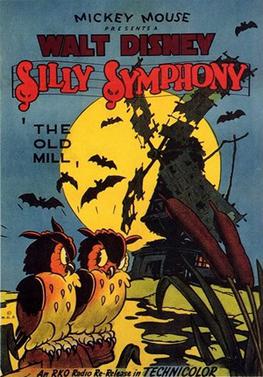Related Research Articles
Silly Symphony is an American animated series of 75 musical short films produced by Walt Disney Productions from 1929 to 1939. As the series name implies, the Silly Symphonies were originally intended as whimsical accompaniments to pieces of music. As such, the films usually did not feature continuing characters, unlike the Mickey Mouse shorts produced by Disney at the same time. The series is notable for its innovation with Technicolor and the multiplane motion picture camera, as well as its introduction of the character Donald Duck, who made his first appearance in the Silly Symphony cartoon The Wise Little Hen in 1934. Seven shorts won the Academy Award for Best Animated Short Film.

The Old Mill is a Silly Symphonies cartoon produced by Walt Disney Productions, directed by Wilfred Jackson, scored by Leigh Harline, and released theatrically to theatres by RKO Radio Pictures on November 5, 1937. The film depicts the natural community of animals populating an old abandoned windmill in the country, and how they deal with a severe summer thunderstorm that nearly destroys their habitat. It incorporates the song "One Day When We Were Young" from Johann Strauss II's operetta The Gypsy Baron.

The Skeleton Dance is a 1929 Silly Symphony animated short subject with a comedy horror theme. It was produced and directed by Walt Disney and animated by Ub Iwerks. In the film, four human skeletons dance and make music around a spooky graveyard—a modern film example of medieval European "danse macabre" imagery. It is the first entry in the Silly Symphony series. In 1993, to coincide with the opening of Mickey's Toontown in Disneyland, a shortened cover of the cartoon's music was arranged to be featured in the land's background ambiance. The short's copyright was renewed in 1957, and as a published work from 1929, it entered the US public domain on January 1, 2025.
Summer is a Walt Disney short film released on January 16, 1930. Directed by Ub Iwerks, it is the sequel to the short Springtime (1929). It is 6 minutes long.
The first wave of Walt Disney Treasures was released on December 4, 2001. It includes four different DVD sets.
Midnight in a Toy Shop is an American 1930 Silly Symphonies animated short film directed by Wilfred Jackson and produced by Walt Disney Productions.
Egyptian Melodies is a 1931 Silly Symphonies animated short subject produced by Walt Disney and directed by Wilfred Jackson.
The Spider and the Fly is a 1931 Silly Symphonies cartoon.
Birds of a Feather is a Silly Symphonies animated Disney short film. It was released on February 10, 1931, by Columbia Pictures.
Mother Goose Melodies is a 1931 Silly Symphonies animated film, directed by Burt Gillett. Two years later it was semi remade in Technicolor as Old King Cole.

Springtime is a Silly Symphonies animated Disney short film. It was released in 1929. It was the third Silly Symphonies film to be produced, just five days before the 1929 Stock Market Crash. The short entered the US public domain on January 1, 2025.
The China Plate is a 1931 Silly Symphonies animated film.
The Busy Beavers is a 1931 Silly Symphonies animated film, directed by Burt Gillett.
Arctic Antics is a Silly Symphonies animated Disney short film. It was released on June 26, 1930.
Monkey Melodies is a Silly Symphonies animated Disney short film. It was released in 1930 as the 13th film in the Silly Symphony Series.
Playful Pan is a Silly Symphonies animated Disney short film. It was released on December 27, 1930, by Columbia Pictures.
The Cat's Out is a Silly Symphonies animated Disney short film. It was released in 1931. The Cat's Out was a working title that survives on an existing vault print; the short was originally copyrighted and released as The Cat's Nightmare.
The Fox Hunt is a Silly Symphonies animated Disney short film. It was released in 1931.
The Bird Store is a Silly Symphonies animated Disney short film. It was released on January 16, 1932, by Columbia Pictures. The cartoon marks the first recorded voice work of Clarence Nash for Walt Disney Productions, and was also the final cartoon in the Silly Symphonies series to be released by Columbia Pictures.

Hell's Bells is a 1929 comedy horror animated short film was directed by Ub Iwerks and produced by Walt Disney. It was distributed into cinemas by the film company Columbia Pictures, who would also distribute other Walt Disney films, such as Winter. The film follows Satan and the other devils' happenings in Hell. One of these devils revolts against Satan, and end up kicking him off the cliff of Hell at the end of the film. The short is part of short film series Silly Symphonies.
References
- 1 2 Merritt, Russell; Kaufman, J. B. (2016). Walt Disney's Silly Symphonies: A Companion to the Classic Cartoon Series (2nd ed.). Glendale, CA: Disney Editions. pp. 98–99. ISBN 978-1-4847-5132-9.
- ↑ "Talking Shorts". Variety : 14. November 17, 1931. Retrieved February 23, 2020.